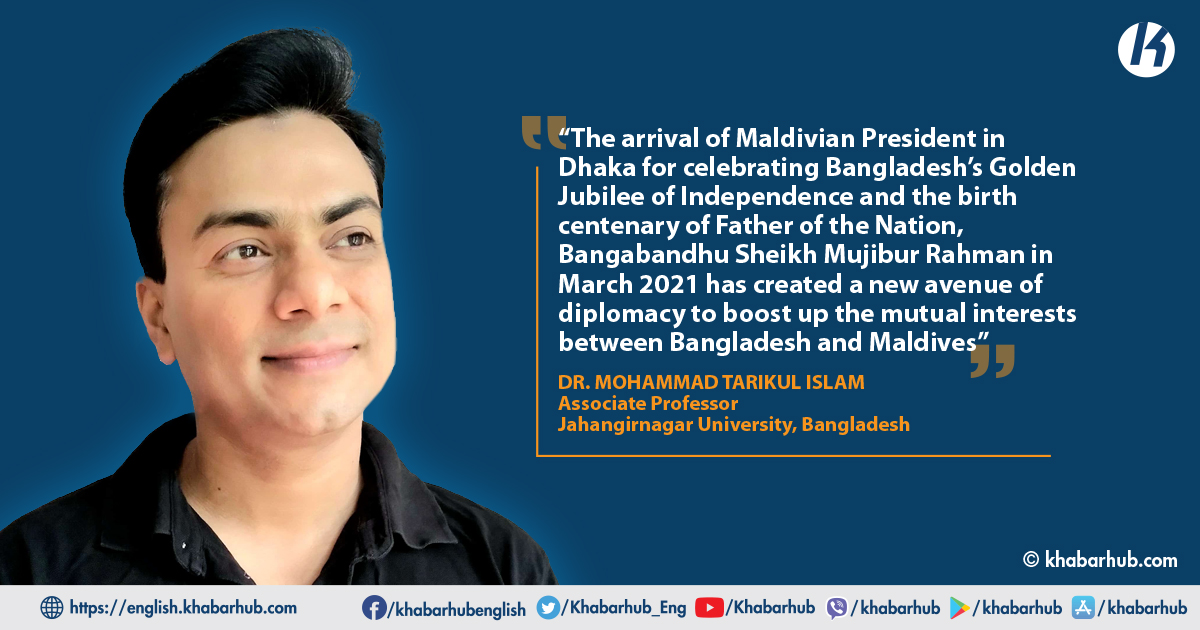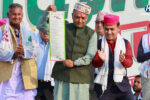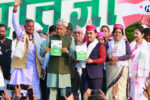The fundamental foreign policies of Bangladesh originate from article no. 25 of the Constitution of Bangladesh. The foreign policy of Bangladesh comprises of personal circumstance techniques picked by the constitution of the nation to defend its national advantages and to accomplish objectives inside its worldwide relations milieu.
The Ministry of Foreign Affairs details and executes the strategies as indicated by the direction from the important segment of the constitution of Bangladesh.
“Friendship to all, malice to none” what Bangabandhu Sheikh Mujibur Rahman articulated in the 1972 constitution is very much relevant still now and Prime Minister Sheikh Hasina is maintaining diplomatic relations with the world following the policy.
Bangladesh and Maldives, countries of South Asia with different ecological conditions, social systems, and historical and cultural backgrounds are making smooth progress in their bilateral relations. The Maldives and Bangladesh established diplomatic relations on 22 September 1978.
The Maldivian president emphasized the issue of climate change for both the nations as low-lying countries in the Indian Ocean.
The Maldives opened its High Commission in Bangladesh in 2008. In 2011 Maldives government removed duty on all Bangladesh exports to the country.
The Maldives closed its High Commission in Dhaka in March 2014 after the foreign ministry budget was slashed by 40 percent. Bangladesh offered to pay rent for embassy premises among other local costs but was refused “politely” by the Maldives.
Notwithstanding the reality, in December 2014 Bangladesh sent 100 thousand liters of water after Maldives sole water desalination plant quit working subsequent to bursting into flames.
The Maldives has resumed its High Commission in Dhaka, almost two years subsequent after closing it due to financial crisis.
The Maldives has a huge number of Bangladeshi migrant workers and has energized the movement of Bangladeshi laborers.
Maldivian government regularized the migration status of in excess of 16 thousand Bangladeshi transients in 2009.
In 2011 Bangladesh traded products worth US$0.72 million and imported US$1.46 million from the Maldives. Bangladesh likewise trades drug medication to the Maldives.
The arrival of the Maldivian President in Dhaka for celebrating Bangladesh’s Golden Jubilee of Independence and the birth centenary of Father of the Nation, Bangabandhu Sheikh Mujibur Rahman in March 2021 has created a new avenue of diplomacy to boost up the mutual interests between Bangladesh and Maldives.
Maldivian President Ibrahim Mohamed Solih highly appreciated the leadership of Bangabandhu and also congratulated Bangladesh for the remarkable economic prosperity that the country has achieved over the past decade.
Strengthening cooperation between the two countries in terms of institutional arrangements as well as in human resource placement, fisheries, health and culture is assured and a new era of cooperation between the two countries will guide the foreign ministries of Bangladesh and Maldives.
The Maldivian president emphasized the issue of climate change for both the nations as low-lying countries in the Indian Ocean.
He remembered to recognize the leading role of Bangladesh in the Climate Vulnerable Forum and the development of a blue economy. President Solih commended Bangladeshi migrants in the Maldives as one of the biggest expatriate workforces in the country and recognized their contribution to Maldives’ economic growth.
Bangladesh and Maldives have as of late marked Memorandum of understanding (MoU) on the Establishment of Joint Commission for Comprehensive Cooperation; Bilateral Foreign Office Consultations (FOC); Cooperation in the Field of Fisheries and Pelagic Fishing; and Cultural Exchange Program (CEP) for 2022-25.
Obviously, Maldives and Bangladesh have confirmed obligation to another time of two-sided participation. In the milieu of fast-changing global structures, more creative steps are required to protect and promote the interests of smaller economies and to maximize mutual interests, I believe.
The Maldives could consider enrollment of Bangladeshi physicians and medical attendants in the Maldives to fortify the limit of the wellbeing area and looking for help in the import of drug things from Bangladesh.
Strengthening cooperation between the two countries in terms of institutional arrangements as well as in human resource placement, fisheries, health and culture is assured and a new era of cooperation between the two countries will guide the foreign ministries of Bangladesh and Maldives.
Thousands of migrant workers from Bangladesh are contributing greatly in various sectors towards the economic development of the Maldives.
The Maldives is keen to promote trade and business with Bangladesh by establishing direct air and sea routes. The statistical evidence suggests that the Maldives now has about 100 students doing higher studies in Bangladesh.
Bangladesh has the potential to provide educational opportunities to more students. Around 60,000 to 80,000 Bangladeshis are now working in the Maldives. The country also recruited doctors and nurses from Bangladesh.
Bangladesh is ready to send more skilled manpower to the Maldives in various professions.
Establishing direct air and water connectivity between Bangladesh and the Maldives to further enhance trade and investment ties between the two countries is the demand of time.
As tourism, a potential sector in both Bangladesh and the Maldives, investors, and businessmen must come forward to work together to utilize the existing potentials of the two states. Maldives can also think of importing international-standard Bangladeshi products, including medicine, ready-made garments (RMG) and ceramics. Such connectivity between Bangladesh and the Maldives would certainly help expand the trade and investment of the two states in the future.
The growing economic and social cooperation between the Maldives and Bangladesh need to pay a particular focus on economic cooperation through trade and investment initiatives, as well as creating an enabling environment for the private sector cooperation in the fields of agriculture, tourism, fisheries, healthcare and pharmaceuticals, among other areas.
We believe, Bangladesh and Maldives will keep the momentum forward to “consolidate the already excellent” relations for the sake of mutual benefit.
New MoU on education and human resources development has to be signed to facilitate such collaboration since the MoU on Cooperation in Education signed in 2011 had already expired.
The Maldives could consider enrollment of Bangladeshi physicians and medical attendants in the Maldives to fortify the limit of the wellbeing area and looking for help in the import of drug things from Bangladesh.
A crucial precondition for the successful conduct of economic diplomacy with a particular focus on the blue economy is the existence of a critical pool of skilled personnel in the government, private sector and civil society between two countries.
This pre-condition is to understand and negotiate trade, investment and other economic issues from the national development perspective after taking into account a country’s strengths, limitations, opportunities and threats.
We want Bangladesh to grow hand in hand with the Maldives. The relationship is deepening as high-level economic exchanges through visits and meetings take place regularly alongside the wide-ranging people-to-people interaction.
We need to have a forward approach so that we can come over with the past heritage based on the spirit of track-II diplomacy.
We believe, Bangladesh and Maldives will keep the momentum forward to “consolidate the already excellent” relations for the sake of mutual benefit.
(Dr. Mohammad Tarikul Islam is an Associate Professor of Government and Politics at Jahangirnagar University in Bangladesh. Prior to joining University in 2014, he was serving United Nations Development Programme, Bangladesh for a period of seven years in different capacities)








Comment